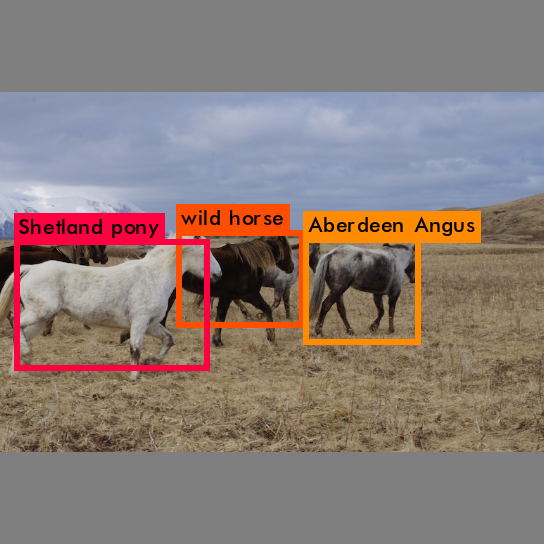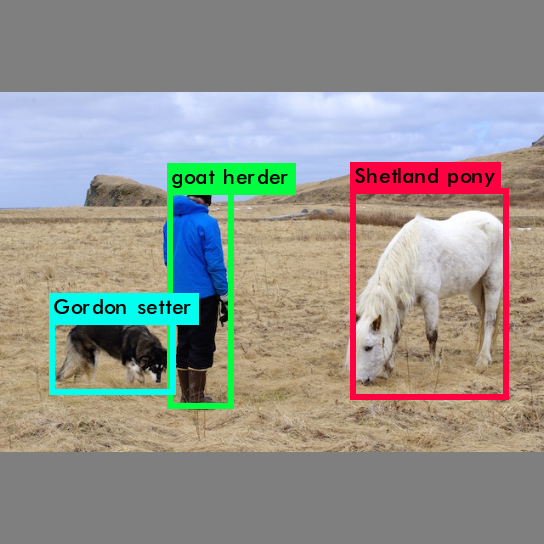YOLO9000: Better, Faster, Stronger - Real-Time Object Detection (State of the art)
git clone --recursive git@github.com:philipperemy/yolo-9000.git
cd yolo-9000
cat yolo9000-weights/x* > yolo9000-weights/yolo9000.weights # it was generated from split -b 95m yolo9000.weights
md5sum yolo9000-weights/yolo9000.weights # d74ee8d5909f3b7446e9b350b4dd0f44 yolo9000.weights
cd darknet
make # Will run on CPU. For GPU support, scroll down!
./darknet detector test cfg/combine9k.data cfg/yolo9000.cfg ../yolo9000-weights/yolo9000.weights data/horses.jpg
git clone --recursive git@github.com:philipperemy/yolo-9000.git
cd yolo-9000
cat yolo9000-weights/x* > yolo9000-weights/yolo9000.weights # it was generated from split -b 95m yolo9000.weights
md5sum yolo9000-weights/yolo9000.weights # d74ee8d5909f3b7446e9b350b4dd0f44 yolo9000.weights
cd darknet
git reset --hard b61bcf544e8dbcbd2e978ca6a716fa96b37df767
make # Will run on CPU. For GPU support, scroll down!
./darknet detector test cfg/combine9k.data cfg/yolo9000.cfg ../yolo9000-weights/yolo9000.weights data/horses.jpg
The output should be something like:
layer filters size input output
0 conv 32 3 x 3 / 1 544 x 544 x 3 -> 544 x 544 x 32
1 max 2 x 2 / 2 544 x 544 x 32 -> 272 x 272 x 32
2 conv 64 3 x 3 / 1 272 x 272 x 32 -> 272 x 272 x 64
3 max 2 x 2 / 2 272 x 272 x 64 -> 136 x 136 x 64
4 conv 128 3 x 3 / 1 136 x 136 x 64 -> 136 x 136 x 128
5 conv 64 1 x 1 / 1 136 x 136 x 128 -> 136 x 136 x 64
6 conv 128 3 x 3 / 1 136 x 136 x 64 -> 136 x 136 x 128
7 max 2 x 2 / 2 136 x 136 x 128 -> 68 x 68 x 128
8 conv 256 3 x 3 / 1 68 x 68 x 128 -> 68 x 68 x 256
9 conv 128 1 x 1 / 1 68 x 68 x 256 -> 68 x 68 x 128
10 conv 256 3 x 3 / 1 68 x 68 x 128 -> 68 x 68 x 256
11 max 2 x 2 / 2 68 x 68 x 256 -> 34 x 34 x 256
12 conv 512 3 x 3 / 1 34 x 34 x 256 -> 34 x 34 x 512
13 conv 256 1 x 1 / 1 34 x 34 x 512 -> 34 x 34 x 256
14 conv 512 3 x 3 / 1 34 x 34 x 256 -> 34 x 34 x 512
15 conv 256 1 x 1 / 1 34 x 34 x 512 -> 34 x 34 x 256
16 conv 512 3 x 3 / 1 34 x 34 x 256 -> 34 x 34 x 512
17 max 2 x 2 / 2 34 x 34 x 512 -> 17 x 17 x 512
18 conv 1024 3 x 3 / 1 17 x 17 x 512 -> 17 x 17 x1024
19 conv 512 1 x 1 / 1 17 x 17 x1024 -> 17 x 17 x 512
20 conv 1024 3 x 3 / 1 17 x 17 x 512 -> 17 x 17 x1024
21 conv 512 1 x 1 / 1 17 x 17 x1024 -> 17 x 17 x 512
22 conv 1024 3 x 3 / 1 17 x 17 x 512 -> 17 x 17 x1024
23 conv 28269 1 x 1 / 1 17 x 17 x1024 -> 17 x 17 x28269
24 detection
Loading weights from ../yolo9000-weights/yolo9000.weights...Done!
data/horses.jpg: Predicted in 7.556429 seconds.
wild horse: 50%
Shetland pony: 84%
Aberdeen Angus: 72%
Not compiled with OpenCV, saving to predictions.png instead
The image with the bounding boxes is in predictions.png.
./darknet detector test cfg/combine9k.data cfg/yolo9000.cfg ../yolo9000-weights/yolo9000.weights data/horses.jpg
./darknet detector test cfg/combine9k.data cfg/yolo9000.cfg ../yolo9000-weights/yolo9000.weights data/person.jpg
Browse on https://pjreddie.com/darknet/yolo/ to find how to compile it for GPU as well. It's much faster!
Make sure that your NVIDIA GPU is properly configured beforehand. nvcc should be in the PATH. If not, something like this should do the job:
export PATH=/usr/local/cuda-8.0/bin:$PATH
export LD_LIBRARY_PATH=/usr/local/cuda-8.0/lib64:$LD_LIBRARY_PATH
Let's now compile darknet with GPU support!
cd darknet
make clean
vim Makefile # Change the first two lines to: GPU=1 and CUDNN=1. You can also use emacs or nano!
make
./darknet detector test cfg/combine9k.data cfg/yolo9000.cfg ../yolo9000-weights/yolo9000.weights data/dog.jpg
The inference should be much faster:
Loading weights from ../yolo9000-weights/yolo9000.weights...Done!
data/dog.jpg: Predicted in 0.035112 seconds.
car: 70%
canine: 56%
bicycle: 57%
Not compiled with OpenCV, saving to predictions.png instead
You can also run the command and monitor its status with nvidia-smi:
+-----------------------------------------------------------------------------+
| NVIDIA-SMI 375.26 Driver Version: 375.26 |
|-------------------------------+----------------------+----------------------+
| GPU Name Persistence-M| Bus-Id Disp.A | Volatile Uncorr. ECC |
| Fan Temp Perf Pwr:Usage/Cap| Memory-Usage | GPU-Util Compute M. |
|===============================+======================+======================|
| 0 TITAN X (Pascal) Off | 0000:02:00.0 On | N/A |
| 26% 49C P2 76W / 250W | 4206MiB / 12189MiB | 10% Default |
+-------------------------------+----------------------+----------------------+
| 1 TITAN X (Pascal) Off | 0000:04:00.0 Off | N/A |
| 29% 50C P8 20W / 250W | 3MiB / 12189MiB | 0% Default |
+-------------------------------+----------------------+----------------------+
| 2 TITAN X (Pascal) Off | 0000:05:00.0 Off | N/A |
| 31% 53C P8 18W / 250W | 3MiB / 12189MiB | 0% Default |
+-------------------------------+----------------------+----------------------+
| 3 TITAN X (Pascal) Off | 0000:06:00.0 Off | N/A |
| 29% 50C P8 22W / 250W | 3MiB / 12189MiB | 0% Default |
+-------------------------------+----------------------+----------------------+
+-----------------------------------------------------------------------------+
| Processes: GPU Memory |
| GPU PID Type Process name Usage |
|=============================================================================|
| 0 30782 C ./darknet 3991MiB |
+-----------------------------------------------------------------------------+
Here, we can see that our process darknet is running on the first GPU.
It was successfully tested on Ubuntu 16.04 and Mac OS. I had it working on MacOS with a previous version of darknet. I now get a SEGFAULT on the newest darknet version with MacOS El Capitan. That's the reason why I pulled a slightly older version of darknet for Mac OS.


